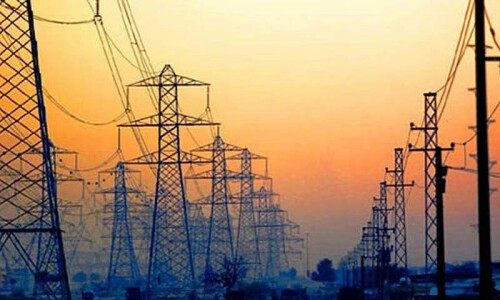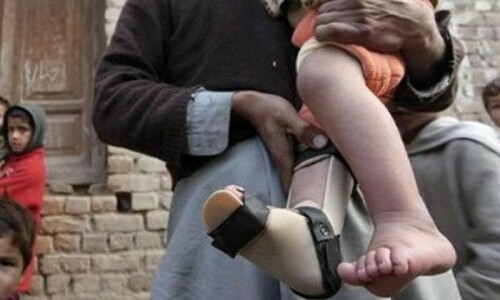MARSHES (Iraq): Miles of reed stalks and baked mud are all that can be seen of much of Iraq’s ancient marshes this year, as a lack of water threatens to turn one of the world’s most important wetlands to wasteland.
Thought to be the biblical Garden of Eden, Iraq’s marshes have for years been more known locally as a haven for smugglers, bandits and kidnappers. Police say recent security gains could be reversed if their inhabitants do not get help.
Dusty boats lie abandoned on caked earth, where water once teemed with fish, and forests of tall reeds gave shelter to migratory birds. Reed stumps now stretch into the horizon, and water buffalo crowd the small remaining pools.
“The water went and now look at us,” said Marsh Arab Zuhair Al Haideri. “Our situation is terrible. We are of this water, the fish, the birds, the reeds and buffalo. Now the marsh is dried. Where’s the help?”
A combination of a lack of rainfall last year, damming of the Euphrates and Tigris rivers and increased agriculture as the country becomes calmer after years of war are putting growing demand on Iraq’s scant water resources.
Whereas Saddam Hussein, who accused the Marsh Arabs of treachery during the 1980-88 war with Iran, dammed and drained the marshes to flush out rebels hiding in the reeds, now there are concerns that neighbouring countries may be choking supply.
According to a United Nations Environment Programme report, about 70 per cent of the water entering Iraq comes from river flow controlled by Turkey, Iran and Syria. Turkey is embarking on a programme of dam building and Iran is also building a new dam.
Marsh water coverage fell to about 43 per cent by mid January from about 71 per cent a year ago, an Iraqi official working to restore the marshes said, but Marsh Arabs say the problem is more severe than the figure suggests.
Haideri’s school-age daughter sat near him washing clothes in a rivulet of water only inches deep, under an overcast but rainless sky. Her father’s skin was dry and cracked with salt now concentrated in the water.
Drought to drugs
Many of the people living in the marshes now have only just returned. After Saddam’s downfall in 2003, locals wrecked many of the dams to let water rush back in, and foreign environmental agencies stepped in to help breath life back into the marshes.
Everything was going well until a year ago, when the waters receded again, said Marsh Arabs of the Al Hammar marsh, one of Iraq’s three main marsh areas.
“This is our life as you see it. We have no water and no livelihood,” said Muthaq Shibab outside his reed home.
Traditional lattice-work huts, or chibayish, that were once built on islands in the marshes, now dot the dry plains.
The marshes covered 9,000 square kilometres in the 1970s, but had shrunk to just 760 square kilometres by 2002. By September 2005 some 40 per cent of the original area was regained, and Iraq aims to recover a total of 6,000 square kilometres.
Vast, remote and bordering Iran, the marshes are an excellent route for drugs and arms smuggling, receiving stolen goods and keeping hostages for ransom.
The area is now safer after Prime Minister Nuri Al Maliki ordered a military crackdown last year, winning him huge support in Iraq’s recent local polls. None of the intense campaigning was evident in the marshes, however.
If the security gains are to hold, the wetlands can no longer be ignored, a regional security official said.
“If the relevant authorities do not turn their attention to the marshes ... then of course anyone who doesn’t have food or work will turn to other means to earn a living,” he said, asking not to be identified.
Outcasts
Rainfall in Iraq’s catchment area last year was less than a third of previous years, and there has been little rain so far this year, with only a few months left till summer.
“Global warming is my analysis. I know some experts say...it’s part of the meteorological cycle,” Iraqi Minister of Water Resources Latif Rashid told Reuters.
Abdulkadhum Yassir, of the Centre for Restoration of Iraqi Marshlands, said the country is fighting back.
In December Iraq started to build dams around the marshes – this time to keep water in, not out.
“In 2009 and 2010, we hope to achieve maximum water coverage with minimal resources. In the wet years we get a lot of water, but it is not properly harnessed,” Yassir said.
The Marsh Arabs have lived in the wetlands for millennia, but are on the fringes of Iraqi society.
The United Nations says a study put the number of Marsh Arabs at 400,000 in the 1950s, but hundreds of thousands have since fled Saddam’s repression or become economic migrants.
Estimates of how many have returned vary wildly. Many Marsh Arabs are illiterate and have had little luck finding work outside the marshes, where they are seen as backward.
“Where do we go now if this situation continues? Before we went to the provinces, but now they’ve seen the misery we bring, they won’t let us come. We have our animals. How can we take them?” said marsh dweller Sughair Iyad.
He wants schools and clinics to be built for his children, and government help to bring water back to the marshes. His mud- and dust-covered children ran around a cluster of huts, and a toddler played next to a water buffalo lying on the ground, the little girl dwarfed by the huge beast.—Reuters













































Dear visitor, the comments section is undergoing an overhaul and will return soon.